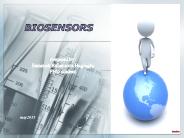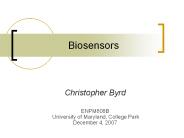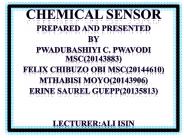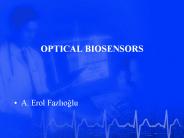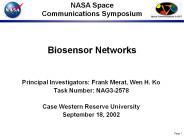Biosensor PowerPoint PPT Presentations
All Time
Recommended
The global biosensors market is estimated to grow at a CAGR of 10.00% to reach $22.68 Billion by 2020
| PowerPoint PPT presentation | free to download
... with a minimum of technical expertise, making it ideal for routine ... Ground beef samples (25g) inoculated with E. coli O157:H7 (0.8 cfu/g) were ...
| PowerPoint PPT presentation | free to view
Browse Complete Summary and Table of Content @: https://www.htfmarketintelligence.com/report/global-biosensors-market
| PowerPoint PPT presentation | free to download
The Biosensors Market size was valued at US$ 18544.5 million in 2019 and is expected to grow at a compound annual growth rate (CAGR) of 11.3% for the forecast period ending 2026 reaching a Market value of US$ 40344.2 million.
| PowerPoint PPT presentation | free to download
Devices that analyze biological samples to better understand structure and function and for diagnostics
| PowerPoint PPT presentation | free to download
Title: Biosensores Author: Mitolab Last modified by: Patricia Meade Created Date: 12/19/2001 4:56:34 PM Document presentation format: Presentaci n en pantalla
| PowerPoint PPT presentation | free to download
... (DNA) Carbon nanotube BioFET Whole Cell Basic functionality Benefits/Challenges Summary References Introduction Biosensor: ...
| PowerPoint PPT presentation | free to download
Coli bacteria Biochip array E. Coli bacteria Bioluminescence The emission of light by a living organism as the result of a chemical reaction.
| PowerPoint PPT presentation | free to download
(General principles and applications) Jayanti Tokas, PhD1; Rubina Begum PhD1; Shalini Jain, PhD2 and Hariom Yadav, PhD2* 1Department of Biotechnology, JMIT, Radaur ...
| PowerPoint PPT presentation | free to download
The biosensors market was valued at $17,500.0 million in 2018 and is expected to reach $38,600.2 million by 2026, registering a CAGR of 10.4% from 2019 to 2026.
| PowerPoint PPT presentation | free to download
A chemical sensor is a device that transforms chemical information (composition, presence of a particular element or ion, concentration, chemical activity, partial pressure.) into an analytically useful signal. The chemical information, mentioned above, may originate from a chemical reaction of the analyte or from a physical property of the system investigated. They can have applications in different areas such as medicine, home safety, environmental pollution and many others.
| PowerPoint PPT presentation | free to download
Title: Biosensores Author: Mitolab Last modified by: Mitolab Created Date: 12/19/2001 4:56:34 PM Document presentation format: Presentaci n en pantalla
| PowerPoint PPT presentation | free to download
Anthony Catalano Any device that analyzes a biological compound into a measurable signal Composed of a bioreceptor, transducer, and an electronic peripheral ...
| PowerPoint PPT presentation | free to download
by modifying swelling properties of the. coating material, by changing the dimension ... Cantilever Array Based Nanotechnology Olfactory Sensors (NOSE) ...
| PowerPoint PPT presentation | free to view
Are you interested in the latest trends, applications, challenges, and advancements in biosensors? Join the Global Webinar on Biosensors, where researchers, scientists, doctors, practitioners, students, and industry professionals will come together to discuss the fundamentals of biosensors, the role of nanotechnology, various types of biosensors, and their applications in fields such as medical and healthcare, drug discovery, environmental monitoring, food industry, and more. The webinar will also cover topics such as wearable and implantable biosensors, immunosensors, MEMS-based biosensors, nucleic acid-based biosensors, enzyme-based biosensors, and 3D printing technologies in biosensor production. Don't miss this opportunity to acquire vital insights into this quickly growing industry and explore the newest technologies and trends that are driving growth and innovation. Register now and be part of this dynamic platform for cross-sectoral collaboration!
| PowerPoint PPT presentation | free to download
and the effect of parameter variations on these quantities.' System : ... BP, LAP, Urine output, Chest tube drainage. Automated protocol for blood infusion -- Rules ...
| PowerPoint PPT presentation | free to view
... by sandwich immunoassay for detection by a fluorescence microtiter plate reader and microscopy ... liposomes in a sandwich hybridization assay for Dengue ...
| PowerPoint PPT presentation | free to view
Biosensors, Polyaniline & Carbon NanoTubes
| PowerPoint PPT presentation | free to download
Biosensors Market are increasingly penetrating medical, environmental, food process, and biodefense application markets.
| PowerPoint PPT presentation | free to download
Rotary: Drive flagella for propelling bacteria Operate as generator producing ATP ... of a rotary motor driving a flagellum (filament). A depiction of F0F1-ATP ...
| PowerPoint PPT presentation | free to download
Main Components Of An Optical Biosensor (i) a light source (ii) an optical transmission medium (fiber, waveguide, etc.) (iii) ...
| PowerPoint PPT presentation | free to download
The latest report by Precision Business Insights, titled “Photoplethysmography Biosensors Market” covers complete information on market size, share, growth, trends, segment analysis, key players, drivers, and restraints.
| PowerPoint PPT presentation | free to download
ELECTROCHEMICAL BIOSENSORS Modern and future approaches to medical diagnostics J. F. Rusling Dept. of Chemistry Dept. of Pharmacology, Univ. of CT Health Center
| PowerPoint PPT presentation | free to view
NASA Space Communications Symposium Biosensor Networks Principal Investigators: Frank Merat, Wen H. Ko Task Number: NAG3-2578 Case Western Reserve University
| PowerPoint PPT presentation | free to download
Cyanide Biosensor. Southern Utah University. Kurt Whittemore, Ray Uchida, Greg ... Pterin-Dependent Oxygenolytic Cleavage to Ammonia and Formate in Pseudomonas ...
| PowerPoint PPT presentation | free to view
... Enzymatic Reactions for Glucose Analysis Thermometric Sensors Thermopile-based Enzyme Probe Optical Sensors Electrochemical Sensors So Why Is This Useful?
| PowerPoint PPT presentation | free to view
ELECTROCHEMICAL BIOSENSORS Modern and future approaches to medical diagnostics J. F. Rusling Dept. of Chemistry Dept. of Pharmacology, Univ. of CT Health Center
| PowerPoint PPT presentation | free to view
Folding-based Electrochemical Biosensors Rebecca Y. Lai Department of Chemistry University of Nebraska-Lincoln 1-16-09
| PowerPoint PPT presentation | free to download
Better Enzymes for Biosensors Or, A Tale of Two Saucy Little Peroxidases Or, Improving Proteins With New Tools & Old Ciar n F g in School of Biotechnology ...
| PowerPoint PPT presentation | free to download
Biosensors are medical devices that are primarily used to sense or detect the presence or concentration of biological substances, such as a biomolecule or a microorganism. They are analytical devices that can convert a biological response into an electrical signal.
| PowerPoint PPT presentation | free to download
Easy to fabricate. Disadvantages. Oxygen consumption(solved) Protein adsorption ... Fabricate outer membrane surface of electrodes. Self Assembled monolayer (SAMs) ...
| PowerPoint PPT presentation | free to view
The Global Biosensors Market size is expected to reach $34.3 billion by 2025, rising at a market growth of 8.6% CAGR during the forecast period. Biosensors are devices which combine biological components for detecting an analyte and a physicochemical component in order to produce a measurable signal. Currently, the most common biosensors are home pregnancy tests and glucose detectors. There is however, a drive to produce novel biosensor technologies for several applications like food analysis, deoxyribonucleic acid testing, and drug detection. Thin films make these sensors increasingly small and with fewer detection limits. Full Report: https://www.kbvresearch.com/biosensors-market/
| PowerPoint PPT presentation | free to download
In the “Glucose Biosensor Market” marketreportslibrary.com describes business development opportunities. The report's purpose is to forecast market size and growth in the future
| PowerPoint PPT presentation | free to download
Semiconduct Biosensor Industry, 2013-2023 Market Research Report' is a professional and in-depth study on the current state of the global Semiconduct Biosensor industry with a focus on the Chinese market.
| PowerPoint PPT presentation | free to download
Title: Test Author: BIOMED Last modified by: Mustafa Sualp Created Date: 9/12/2000 3:32:02 PM Document presentation format: On-screen Show Company
| PowerPoint PPT presentation | free to view
Allow us to examine Chemistry at high resolution at solid-liquid & liquid-liquid ... For more info, contact http://www.chinstruments.com/index.html ...
| PowerPoint PPT presentation | free to view
Fluorescence Illuminates Chemical Warfare Agents. What is a Biosensor? ... This new idea stems from the urgency to detect chemical warfare agents very quickly. ...
| PowerPoint PPT presentation | free to view
According to the latest research report by IMARC Group, The global biosensors market size reached US$ 26.5 Billion in 2022. Looking forward, IMARC Group expects the market to reach US$ 43.0 Billion by 2028, exhibiting a growth rate (CAGR) of 8.2% during 2023-2028. More Info:- https://www.imarcgroup.com/biosensors-market
| PowerPoint PPT presentation | free to download
Discrete optical components (laser, photodetector, and filters) Serial ... Progress: Design of Monolithically Integrated Laser, Photodetector, and Filter ...
| PowerPoint PPT presentation | free to view
Fabrication of Nanoscale BLM Biosensors. Tadahiro ... Fabrication of a stable platform for transducing signals through ... Substrate Fabrication ...
| PowerPoint PPT presentation | free to download
Biosensors Market categrizes the Global market by Type, Product (Wearable, Non-wearable), Technology, Application (POC, Home Diagnostics, Research Lab, Environmental Monitoring, Food & Beverages, Biodefense) and Region. COVID-19 Impact on Biosensors Industry.
| PowerPoint PPT presentation | free to download
In the past few years, the demand for point-of-care testing (POCT) has risen considerably, which is further creating need for portable and integrated devices. A POCT is a test which can be performed at or near the site of patient whenever the medical care is required. The technique has become an indicator of in vitro diagnosis, which is ascribed to its rapid, simple, low cost, and portable nature . The patient can be provided with result immediately outside of a laboratory, which is why POCT is also being widely utilized in hospitals as well. POCT further aids in improving patient care through remote patient care monitoring.
| PowerPoint PPT presentation | free to download
The global biosensors market is estimated to grow at a CAGR of 10.00% to reach $22.68 Billion by 2020.
| PowerPoint PPT presentation | free to download
The global Glucose Biosensors market was valued at 3367.7 million in 2020 and is projected to reach US$ 3565.2 million by 2027, at a CAGR of 1.4% during the forecast period.
| PowerPoint PPT presentation | free to download
The Global Biosensors Industry 2015 Deep Market Research Report is a professional and in-depth study on the current state of the Biosensors industry. The report provides a basic overview of the industry including definitions, classifications, applications and industry chain structure.
| PowerPoint PPT presentation | free to download
The overall biosensors market is expected to grow from USD 21.2 billion in 2019 to USD 31.5 billion by 2024, at a CAGR of 8.3%
| PowerPoint PPT presentation | free to download
Surface Plasmon Resonance Biosensors Characteristics of SPW Characteristics of SPW Surface Plasmon Resonance --- SPR is a real-time ...
| PowerPoint PPT presentation | free to view
iNANO and Department of Physics and Astronomy, University of Aarhus, ... surface combined with a localized evanescent field gives high sensitivity and selectivity. ...
| PowerPoint PPT presentation | free to view
This report studies Nano Biosensors in Global market, especially in North America, Europe, China, Japan, Korea and Taiwan, focuses on top manufacturers in global market, with capacity, production, price, revenue and market share for each manufacturer, covering Analog Devices Nippon Denso Omron Robert Bosch Roche Nimblegen Freescale STMicorelectronics Sensonor AS Toshiba
| PowerPoint PPT presentation | free to download
Title: frost.com Author: Janet Cook Last modified by: Frost & Sullivan Created Date: 6/11/1999 8:13:48 AM Document presentation format: On-screen Show
| PowerPoint PPT presentation | free to download
According to a new market report published by Persistence Market Research “Global Market Study on Biosensor: Asia-Pacific to Witness Highest Growth by 2020,” the global biosensor market was valued at USD 12,963.6 million in 2014 and is expected to grow at a CAGR of 9.7% from 2014 to 2020, to reach an estimated value of USD 22,551.2 million in 2020.
| PowerPoint PPT presentation | free to download
Batch fabrication and. Low cost ... FABRICATION RESULTS - COMPLETE SEQUENCE. Uncompensated mechanical stress ... FABRICATION RESULTS - FINAL DEVICE ...
| PowerPoint PPT presentation | free to download
[191 Pages Report] Biosensors market research report categorizes global market by application (point of care, home diagnostics, research labs, biodefense, environmental monitoring, food industry), product (wearable, non-wearable), technology (electrochemical, piezoelectric, optical) & geography
| PowerPoint PPT presentation | free to download
Biosensors Market research report delivers a comprehensive study on production capacity, consumption, import and export for all major regions across the world. The report provides is a professional inclusive study on the current state of the market. Analysis and discussion of important industry like market trends, size, share, growth estimates are mentioned in the report.
| PowerPoint PPT presentation | free to download
The biosensors market is valued at USD 25.5 billion in 2021 and is projected to reach USD 36.7 billion by 2026; it is expected to grow at a CAGR of 7.5% from 2021 to 2026.
| PowerPoint PPT presentation | free to download
biosensors market is expected to grow from USD 21.2 billion in 2019 to USD 31.5 billion by 2024, at a CAGR of 8.3%
| PowerPoint PPT presentation | free to download





